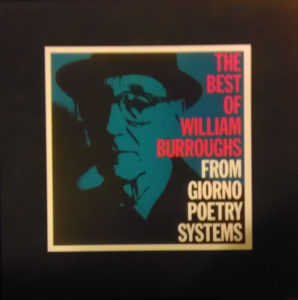
William S. Burroughs – The Best of William Burroughs from Giorno Poetry Systems Mercury 314 536 701-2 (1998)
Burroughs was the godfather of the Beats. And yet, his extensive career giving spoken word recitations is, in a way, just as significant as his writings themselves (most of his readings were of his own writings) — setting aside entirely his sonic cut-up audio field recordings and mixed media visual artworks. As a live performer, he worked his way through small venues, much like punk bands (and often in the same clubs that did punk shows). His intonation, pacing and inflection did evolve though. Listening to four CDs of material covering a long stretch of time reveals how he fine-tuned his delivery. He mastered his sneering, nasal delivery, with certain words drawn out for effect, speaking often in a kind of deadpan but breaking from it regularly for emphasis. And comparing these recordings from 1975 onward shows marked advancement over his 1960s recorded monologues.
Burroughs came from a fairly privileged upbringing and was highly educated. He mostly used that background to more effectively mock rich elites and to astutely document what goes on in the world outside the realm of respectability. He gets inside the self-important, smug and arrogant sense of entitlement in cutting, satirical narratives, which often explore basic countercultural themes and the realities of life for the poor. His aloof, profane, magnificently unsentimental, and often scowling demeanor had a way of depicting vileness with an icy frankness that makes his accounts endearing, in their own startling and unexpected way, fostering a kind of cabal or union of outcasts and freaks who are onto the cons too. As Barry Miles said about Burroughs in an interview,
“His overall concern was always to confront control systems and attack them. In literature it was usually done through humour . . . where he would take ideas to some absurd length which breaks through all the normal boundaries of good taste and decorum and it was often hilariously funny.”
No doubt, Burroughs exudes a kind of political libertarian populism, but it runs close anarchism. At his best (and this Best of collection surely lives up to delivering the man at his best) he could hilariously depict the “country simple” wisdom of the underclasses as fully aware of the grim power struggles playing out under the guise of “neutral” politics that just so happen to prop up elites (something that was most explicit in his essays and Cities of the Red Night). Burroughs was always on the look out for new techniques to disrupt the smooth functioning of oppressive social structures, taking particular glee in uncovering the overlooked (if not explicitly hidden) and elemental institutional mechanisms that maintain such relations between people. He can be delightfully ruthless in exposing the vile motives of the self-satisfied “pillars of the community,” like doctors, journalists, police, and so on. Burroughs’ characters are sometimes surprisingly conventional, even as he takes a very unconventional approach to developing and introducing them. Burroughs also knows how to deliver an iconic catchphrase, taking colloquialisms to new heights by building so much around them to contextualize their lasting value. He can also summon a sense of paranoia like few others. And all this is not to mention his pervasive interest in fringe theories: UFOs, orgone accumulators, and that sort of thing.
Burroughs’ writings were often picaresque, heavily influenced by Céline, but also drawing on the influence of Denton Welch, Rimbaud, Genet, Conrad and others. The picaresque style lends itself to short — and humorous — readings, the excerpts able to stand on their own. But from Welch, Burroughs also drew on an ability to describe the ordinary in an uncommon way, and how to reveal with honesty that which is obscured. Burroughs is able to summon and expand on those qualities in his readings.
As to the actual recordings here, they are mostly arranged chronologically by the date the underlying text was published — irrespective of when the audio was recorded, to some extent. Then the last disc features a segment called “Nothing Here Now But the Recordings,” which are not based on any previously published texts, but includes lectures and audio experiments, such as the “inching” technique Burroughs employed by manually moving magnetic audio tape through a recorder.
Burroughs actually made many, many commercially released recordings. This set is exclusively material released on John Giorno‘s label Giorno Poetry Systems, often originally released on albums with contributions from many different performers (rather than exclusively from Burroughs). There are many more Burroughs recordings out there, very few of which were ever sold in any quantity. What is here focuses primarily on spoken word recitations, mostly readings of Burroughs’ own published writings. The recordings not present here delve more fully into experimental sound collages (see Real English Tea Made Here) and collaborations with musical groups (see Spare Ass Annie and Other Tales, The Black Rider). But there are also various other spoken word albums Burroughs made that were simply made for other record labels (see Call Me Burroughs, Break Through in Grey Room, etc.).
Reading Burroughs is near mandatory. But a complete picture of the man’s work requires exploring his other efforts, especially his audio recordings. The Best of William Burroughs From Giorno Poetry Systems makes an ideal introduction to those audio recordings. And just as to Burroughs’ outlook, a world that continues to lurch closer to a police state can stand to learn from Burroughs’ intelligent studies in ways to counteract those tendencies.

